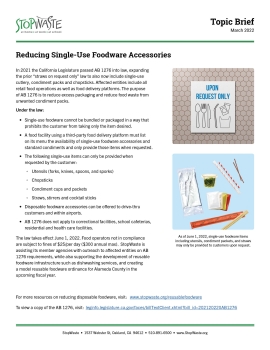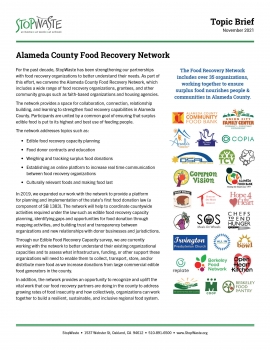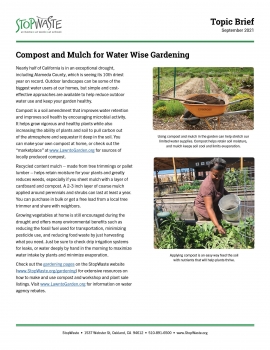Monthly Topic Briefs
Updates on current issues and projects.

California has increasingly been setting ambitious targets to reduce greenhouse gas (GHG) emissions and slow climate change. To help the state meet its goals, local jurisdictions have outlined their own commitments to climate action locally in the form of Climate Action Plans (CAPs). Alameda County was one of the first California counties in which all jurisdictions have developed CAPs.

A new State law, SB 54, known as the Plastic Pollution Prevention and Packaging Producer Responsibility Act, sets new goals to reduce plastic packaging and requires that all forms of single-use products be recyclable or compostable by 2032.

This awards program honors Alameda County businesses and institutions whose leadership and continuous efforts to improve environmental performance and business efficiency have achieved outstanding results. Since the inception of the awards program in 2000, well over 100 Alameda County businesses and institutions have been recognized.

StopWaste’s RE:Source Guide is Alameda County’s one-stop shop for answers on what to do with an unwanted item. The Guide provides easy access to information on proper disposal with the goal of maximizing the benefits of compost, reuse, repair and recycling, while minimizing contamination from items going in the wrong bin.

A new California State law, SB 1383, aims to keep food and other compostable materials out of landfills to reduce methane emissions that contribute to climate change. An important requirement of the law is that food generating businesses must recover surplus edible food that would otherwise be disposed of and donate it to feed people.

In 2021 the California Legislature passed AB 1276 into law, expanding the prior “straws on request only” law to also now include single-use cutlery, condiment packs and chopsticks. Affected entities include all retail food operations as well as food delivery platforms. The purpose of AB 1276 is to reduce excess packaging and reduce food waste from unwanted condiment packs.

A new California State law, SB 1383, aims to keep food and plant materials out of landfills to reduce emissions that contribute to climate change (food scraps emit more methane than any other material in the landfill). Under the law residents must properly sort recyclable and compostable materials into the appropriate containers.

In 2017, StopWaste began working with the Alameda County Resource Conservation District and later additional partners (The Natural Resource Conservation Service and UC Merced) to add to the body of knowledge on how carbon farming can fight climate change through the application of compost on range lands.

Historically, residents in multifamily buildings have faced barriers to improving their homes. In many cases, buildings are not maintained, and retrofits are long overdue. To address this challenge, StopWaste is working with local partners to implement energy efficiency projects in multifamily properties that also improve resident comfort, safety and health.

For the past decade, StopWaste has been strengthening our partnerships with food recovery organizations to better understand their needs. As part of this effort, we convene the Alameda County Food Recovery Network, which includes a wide range of food recovery organizations, grantees, and other community groups such as faith-based organizations and housing agencies.

A great place to look for water savings year round is outdoors in the landscape. If you’re ready to move on from having a water-thirsty lawn, try sheet mulching for the least expensive and most effective way to convert your lawn to a garden.

Nearly half of California is in an exceptional drought, including Alameda County, which is seeing its 10th driest year on record. Outdoor landscapes can be some of the biggest water users at our homes, but simple and cost-effective approaches are available to help reduce outdoor water use and keep your garden healthy.